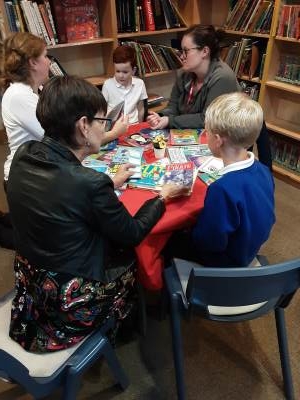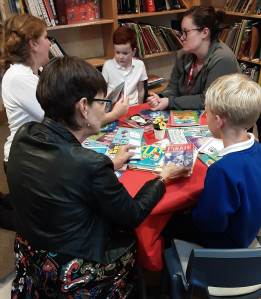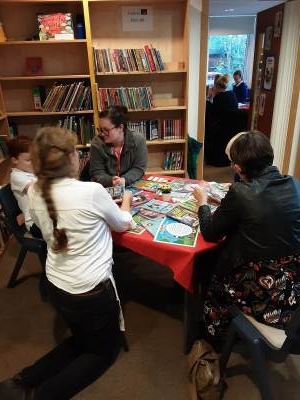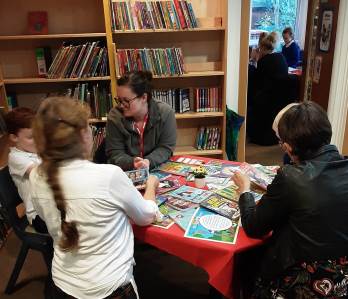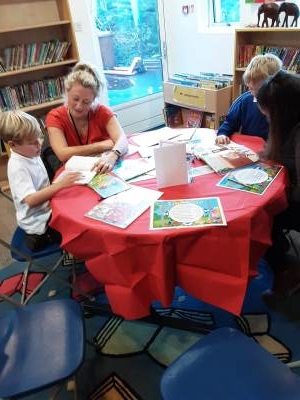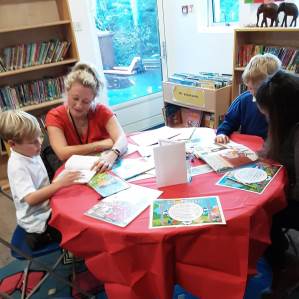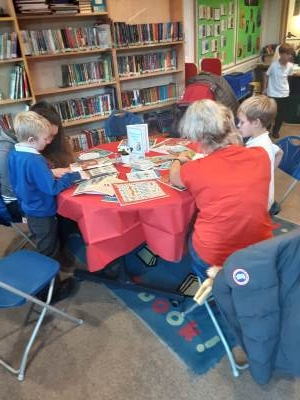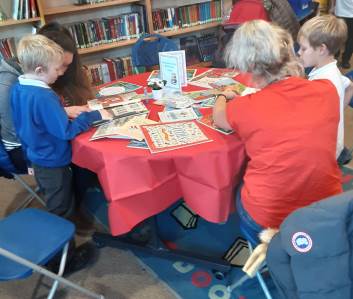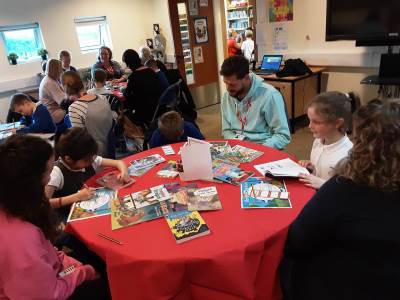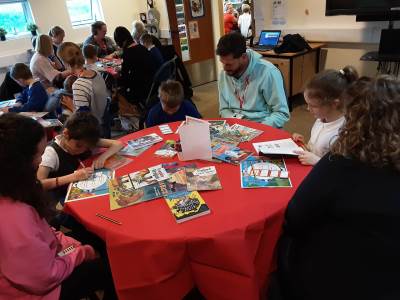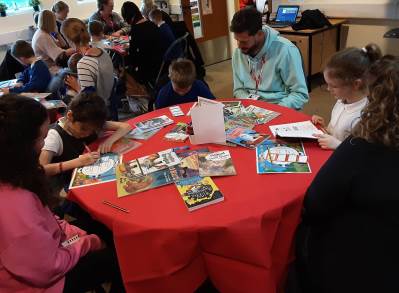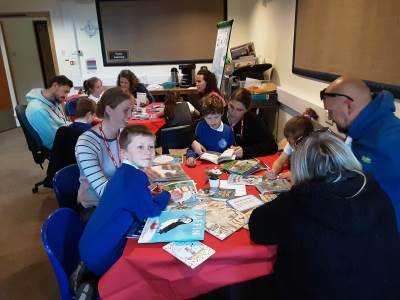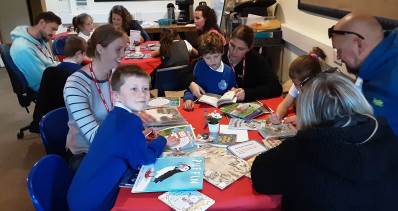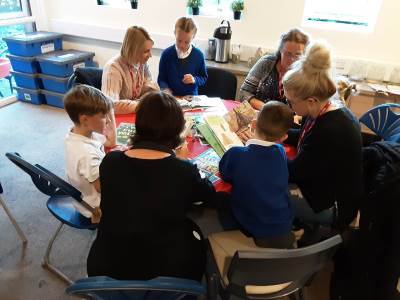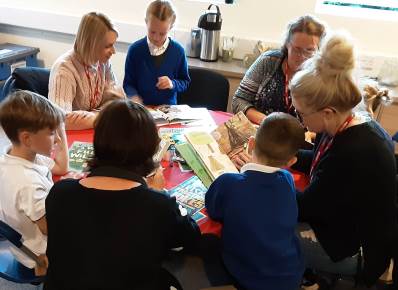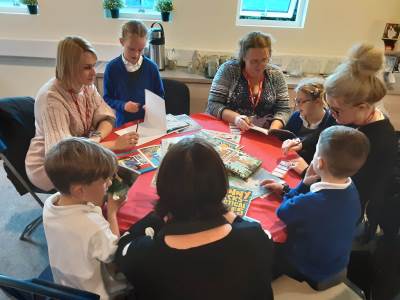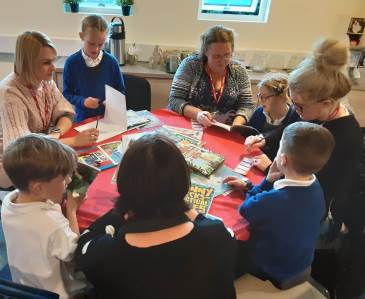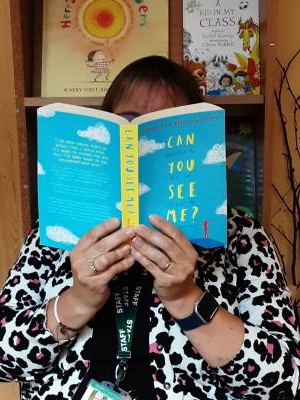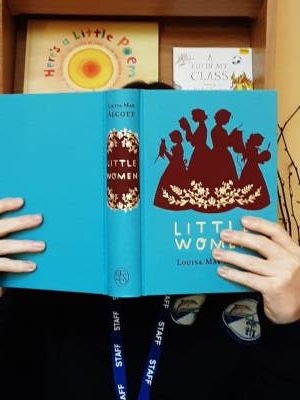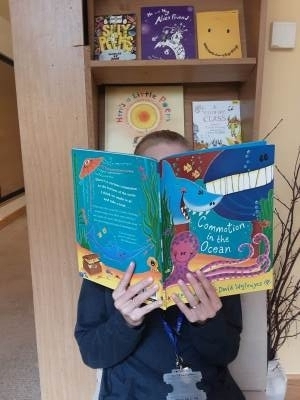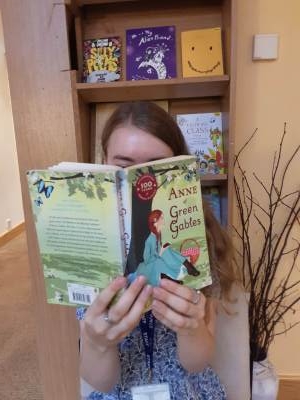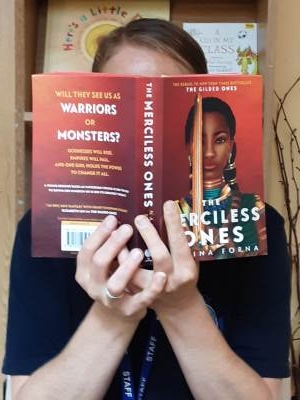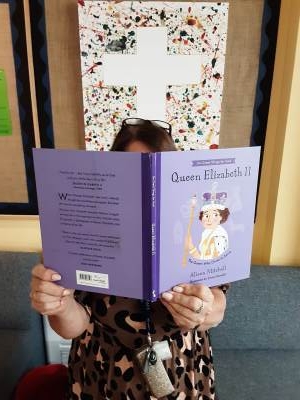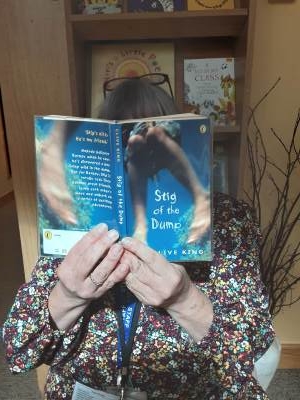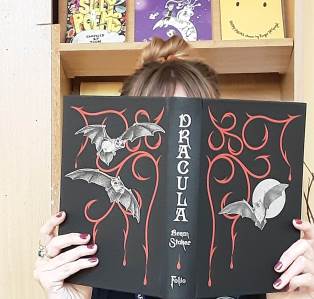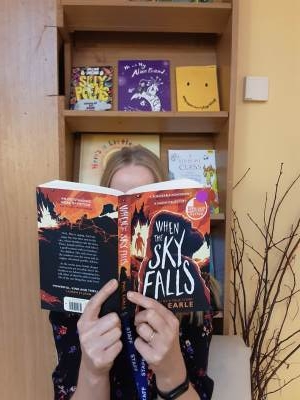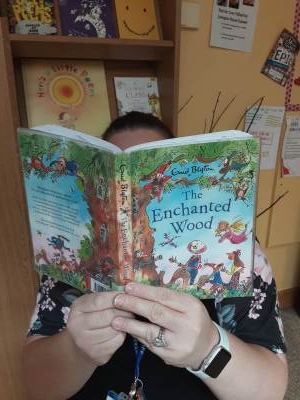English
At Pinhoe C of E Primary School, English is the foundation of our curriculum.
Our aim is to ensure that every child develops the reading, writing and speaking and listening skills to access education and improve their life chances. We ensure that English is not only taught as a discrete subject but that it is embedded throughout the curriculum. Through using high-quality texts, immersing children in vocabulary-rich learning environments and ensuring curriculum expectations and the progression of skills are met, our children will develop the knowledge and skills for future learning. Children will experience a language-rich, continuous English curriculum which will enable them to develop a love of reading, writing and purposeful speaking and listening. We want our children:
- to speak clearly and audibly in ways which take account of their listeners;
- use discussion in order to learn; they should be able to elaborate and explain clearly their understanding and ideas
- to listen with concentration in order to be able to identify and understand the main points of what they have heard;
- to be confident, independent readers who are enthusiastic and reflective through contact with challenging, high-quality texts, including class readers enjoyed by the whole class;
- to enjoy writing and be able to communicate confidently through the written word;
- to write clearly, accurately and coherently, adapting their language and style for a range of contexts, purposes and audiences;
- to take pride in the presentation of their writing and develop a neat, joined, handwriting style;
- to develop independence in identifying their own areas for improvement in writing and through editing their work effectively.
During English lessons, children experience a whole-class activity (which may include shared reading or writing and focused investigations into grammar, spelling or vocabulary), followed by independent, paired or group activities (during which some children receive support or guided activities by teachers and teaching assistants). Plenary sessions will review progress, address shared misconceptions or direct future learning. Opportunities are provided through which children are able to experience a wide range of texts and use a range of resources such as dictionaries, thesauruses and phonic resources to support their work.
Reading at Pinhoe Primary School
Intent
At Pinhoe C of E Primary School, we aim to develop a life-long love of reading in every child. We work hard to create a reading culture, where children actively engage with reading at every opportunity, and where their imagination and understanding of the world is enhanced through reading.
Children are exposed to a range of high-quality texts in a variety of contexts. They are given opportunities to browse literature, hear texts read aloud, participate in structured reading activities and read independently. Children build preferences in reading (authors and styles), and they share book recommendations with peers and adults.
Opportunities are provided to enable children to acquire knowledge through reading; reading is an integral part of the curriculum offer across all subjects.
We prioritise reading as a fundamental right. We believe that secure reading skills are crucial to a high-quality education and give children the tools they need to participate as a member of society.
Implementation
Reading for Pleasure
Research evidence shows that reading for pleasure is important for both educational purposes as well as personal development ( Clark and Rumbold, 2006). Reading for pleasure opens new worlds of imagination, allows us to access fascinating information and gives us an insight into places and times that we have never visited. To promote reading for pleasure, we celebrate reading through annual events like World Book Day, we have visually engaging reading displays and create inviting reading areas in the classrooms. Our fantastic school library is well stocked with tantalising texts to appeal to all interests, and our highly-experienced school librarian is always keen to help with book choices. Each class has a timetabled library slot and the library is also open at lunchtimes and after school. We share our passion for reading by creating time for sharing book recommendations between staff and children (which really helps if you are not sure which book to choose next!). At the end of each day, we have a dedicated 15-minute slot for enjoying a class story together. These read-aloud texts are high-quality and they are carefully chosen to appeal to the children as well as to expose them to a growing range of texts.
Independent Reading
Children start to read using phonically decodable books (see Phonics Mission Statement, below). Books are selected by an adult in class. When children have read to an adult in class, they take their book home to practise reading. They also take home a library book of their choice to read with their parent/carer. As children’s reading skills, fluency and confidence increase, they select books based on their Accelerated Reader (AR) range and their interests. They read for sustained periods of time, increasing the length and complexity of texts that they read. Teachers monitor progress through AR reports and formative assessments. Each time a child finishes their AR book, they take an online quiz which provides key information for the teacher. Children are encouraged to share book recommendations in class, as this generates engagement with independent reading and it also helps children to select their next read. In addition to reading an AR book, children have a library choice book to take home. Many independent fiction and non-fiction book choices can be accessed online, as well as through physical book choices.
Guided Reading
Teacher-led guided reading enables the children to learn and practise specific reading skills with their teacher. Guided reading focuses on word recognition, vocabulary and meaning making. Depending on the age and stage of the child, the balance of focus will differ. In Y1 for example, the children will focus on phonics/word recognition skills for a greater proportion of the session but vocabulary teaching and book discussion will also take place. Strategies for working out the meaning of a word will continue to be explored in guided reading sessions throughout the school but a larger proportion of the time will be spent on developing meaning making as the children journey through school. This is taught through a combination of the teacher reading aloud, pupils reading, teacher modelling and questioning. Explicitly teaching comprehension skills (including predicting, summarising, clarifying and questioning) also enables children to infer and retrieve meaning from texts. Making meaning from a text is an essential life skill which opens the door to learning.
In EYFS and KS1, SFA's Shared Reader programme is used to inform daily planning and teaching of reading. In KS2, guided reading is taught daily, using high-quality real books with rich text potential. Rethink Reading is used to inform the planning .
Phonics
At Pinhoe Primary School, the FFT Success for All programme is used for the teaching of phonics (see our Phonics page for full details: Phonics). Phase 1 phonics teaching starts in Preschool. Success for All has a systematic delivery and assessment programme that is used throughout the Foundation Stage and KS1. It is a statutory requirement that towards the end of Year One, children take a phonic screening test. Please follow this link for our Phonics Mission Statement: Phonics Mission Statement
Shared Reading
During the first week of each writing teaching sequence children are immersed in a carefully selected, high-quality text, which is used as a model for exploring writing at a higher level than children could access independently. Over the course of an academic year, shared reading provides opportunities for children to explore texts from a variety of contexts, cultures and genres. Book Writes Teaching Sequences are used as the core planning resource in order to ensure continuity and progression. Through shared reading, children have opportunities to respond to the text, map and learn the text, explore text structure and summarise text features.
Reading across the Curriculum
Topic box sets of books and texts from the Curriculum Map support learning across the curriculum. In KS1, children listen to and discuss information books and other non-fiction and related narrative/poetry texts to establish the foundations for their learning in other subjects. As they become more confident readers, they independently read texts which develop their knowledge across the wider curriculum. Children are taught to apply the skills of information retrieval to textbooks from across the curriculum and in contexts where they are genuinely motivated to find out information. Our well-stocked, fascinating library supports reading across the curriculum, as do our online libraries.
Impact
By the time children leave Pinhoe C of E Primary School, they:
- have been exposed to high-quality texts in a range of contexts.
- are competent readers who can recommend books to their peers.
- have a thirst for reading and participate in discussions about books.
- can read books to enhance their knowledge and understanding of all curriculum subjects, and communicate their research to a wider audience.
- have developed the reading skills they need to access their next phase of education.
Progression in Reading
Pinhoe Read Aloud Spine 2023_24
Reading Round-up April 2023
From enjoying the daring adventures of international storyteller, Clive Pig, to our bagging brilliant book bargains at our 50p sale, we've got all the latest reading news in this half term's Reading Round-Up. Read all about it here...
Welcome to the Pinhoe Reading Cafe!
Pinhoe's Poetry Extravaganza!
We love reading too - can you guess who?
Supporting reading at home
reading-with-your-child-booklet-for-parents.pdf
As well as receiving knowledge-matched reading books, all pupils take home Reading for Pleasure books, provided by the School Library Service. We encourage these books to be shared together at home, child and adult, no matter what age the child is.
"Reading for pleasure is the single most important indicator of a child’s future success" OECD 2002. Below are some links to external websites which explain more about reading for pleasure and give some great book recommendations if you are looking for ideas at home.
Read for Empathy book collection
Book Chat - sharing books with your child and encouraging a love of reading.
Click on the link above to view three short films, which model for parents how to read in a way that involves children and encourages book chat. Book chat is the informal conversation that accompanies quality reading with and to children. It develops their language, comprehension and pleasure.
Writing at Pinhoe Primary School
Intent
At Pinhoe, we want our children to be confident and enthusiastic writers, who have the writing skills and knowledge necessary for their future lives. We intend to deliver an English Curriculum designed to inspire, enable and empower children’s written and oral communication. We aim that our children will:
- have a positive attitude to writing
- write clearly, accurately and coherently, adapting their language and style in and for a range of contexts, purposes and audiences
- develop their own writing from high quality text models
- apply grammatical knowledge in their writing
- apply phonetic and spelling knowledge in their writing
- develop resilience throughout the writing process, ensuring that editing and redrafting is an integral part of the learning experience
- have opportunities for writing purposefully through other areas of the curriculum and beyond school.
Implementation
In Early Years, children develop their literacy skills through the early learning goals. Children are taught how writing is a form of communication and are encouraged to mark make on entry to school. Letter formation is developed alongside Success for All Phonics, to make links between phoneme, grapheme and letter shapes. Small guided groups in reading and phonics teach the children the early skills needed for reading, writing, speaking and listening, which are then built on through carefully planned independent activities where they are encouraged to discover and explore the different areas of literacy. They are given continuous access to reading books and the writing area offers ‘real life’ opportunities for children to practise and embed their writing skills.
In Key Stage One and Key Stage Two, the key elements of writing teaching sequences are:
- high-quality, authentic text models
- an engaging, purposeful written outcome
- assessment for learning to inform planning
- teaching grammar and punctuation in context
- the stages of immersion, practice writing and independent writing.
During the sequences, teachers model the skills involved in writing, and provide feedback through shared and guided writes to enable the children to feel confident to apply their new skills to their own piece of independent writing. In some cases, links will be made by the teacher to the topic being studied that half term to give purpose to their final written outcomes. Throughout the sequence, there are regular assessment opportunities providing the children with that vital chance to receive and respond to feedback and allow teachers to adapt their planning and teaching to support all of the children to meet their targets. In addition to writing in English lessons, teachers plan for pupils to practise and apply the skills, knowledge and understanding acquired within writing sequences to other areas of the curriculum.
Spelling
Spelling is an important focus at Pinhoe C of E Primary and is carefully built on throughout each year group. During Year 2, children begin to make the shift from spelling phonetically to spelling accurately, using specific strategies, spelling patterns and rules.
Using the No-Nonsense Spelling Programme, children encounter regular discreet spelling lessons which gradually build on their spelling knowledge to help them become competent spellers. The children have access to a range of resources in class to help support them, such as spelling bookmarks where they record spellings that are personal to them, jotters that encourage children to experiment with their spelling and speed sound charts.
Handwriting
Handwriting is a basic skill that influences the quality of work throughout the curriculum. Children are taught to write legibly, fluently and at a reasonable speed. Children are taught discreet handwriting lessons and are expected to maintain a neat, joined style throughout their writing. Our intention is to make handwriting an automatic process that does not impede the creativity of the wider writing process. We use the Letter-join scheme to help plan for a consistent approach towards the teaching of handwriting and to provide a link between school and home handwriting practice.
Impact
By the time children leave Pinhoe C of E Primary School, they have made good progress from their own personal starting points. By the end of Year Six they will be able to write clearly and accurately and adapt their language and style for a range of contexts, purposes and audiences. Our children will have acquired a wide vocabulary and have a strong command of the written word. Most importantly, they will have developed a love of writing, be able to clearly communicate their ideas and be well equipped for the rest of their education.
Pinhoe_Writing_Progression_Year_1
Pinhoe_Writing_Progression_Year_2.
Pinhoe_Writing_Progression_Year_3.
Pinhoe_Writing_Progression_Year_4.
Pinhoe_Writing_Progression_Year_5
Pinhoe_Writing_Progression_Year_6
Spoken Language
The National Curriculum for English reflects the importance of spoken language in pupils’ development across the whole curriculum – cognitively, socially and linguistically. Spoken language underpins the development of reading and writing. The quality and variety of language that pupils hear and speak are vital for developing their vocabulary and grammar and their understanding for reading and writing.
At Pinhoe Primary, through group and class activities, children learn to explain, explore and develop their talk repertoire for different purposes and audiences. They develop their capacity to explain their understanding of books and other reading, and to prepare their ideas before they write. Children develop confidence and competence in spoken language and listening skills, so that by the end of Key Stage 2, they have effective communication skills in readiness for later life. Children are also taught to understand and use the conventions for discussion and debate.
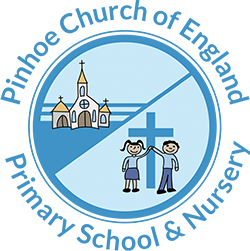
 Cedar Tree
Federation
Cedar Tree
Federation
